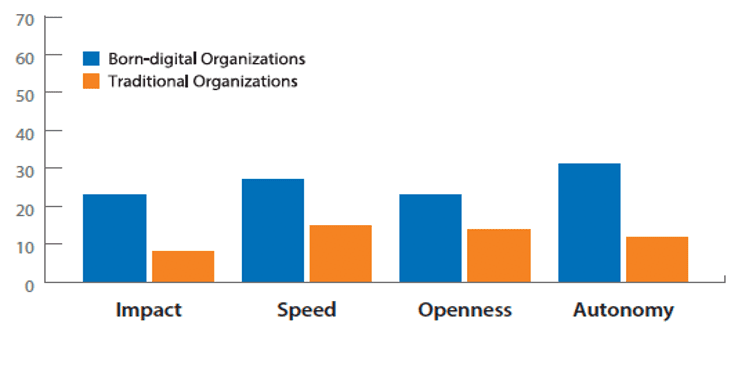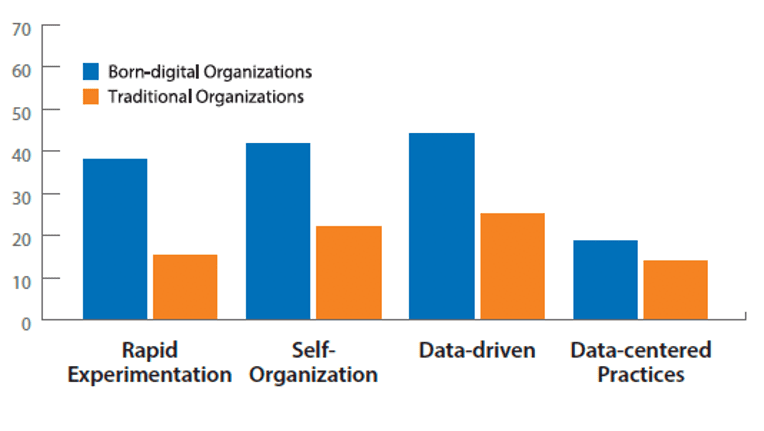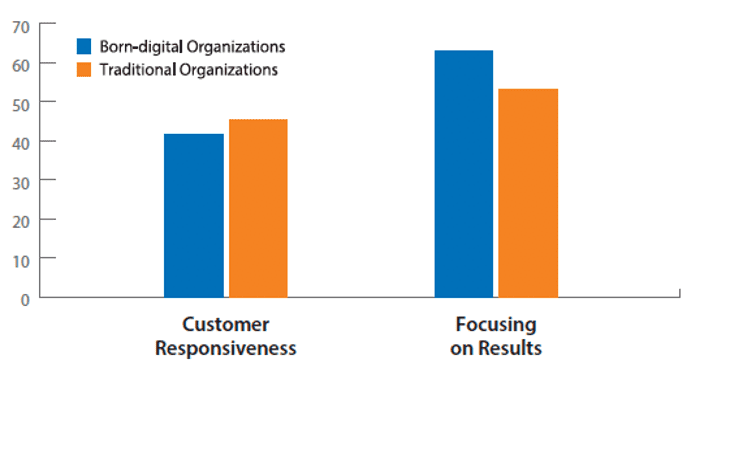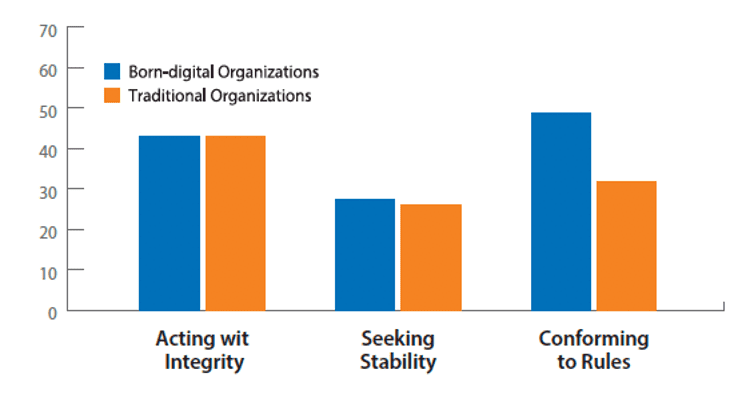
Click to learn more about author Deborah Soule
This is the sixth part of a series on digital transformation. Read Part One titled Where is Your Organization on the Digital Transformation Journey? Part Two is titled Stages of Transition in Becoming a Digital Organization. Part Three is titled Learning from the Cultures of High-Performing Digital Organizations. Continue with Part Four Insights Into the Cultures of High-Performing Digital Organizations and Part Five, Characterizing a Digital Culture for a background.
We conducted a survey to explore cultural differences across a range of organizations. We asked respondents about the values and practices associated with successful digital companies. We also asked about practices that past research has identified as common elements of culture in traditional organizations. In addition, we asked respondents about their organizational environment, organization performance, and the availability, quality, and use of digital resources at their organizations. Respondents self-categorized their organizations as “born-digital” or “traditional.”
Here are some key findings:
- The cultural profiles of self-described born-digital organizations closely matched the values and practices of successful digital companies, as described earlier.
- The cultural profiles of self-described traditional organizations exhibited some markers of digital culture. Digital values and practices were weaker or less common across this subset of organizations. The is good news is that digital values and practices are not completely out of reach for traditional organizations.
- Practices such as acting with integrity and seeking stability were common among both born-digital and traditional organizations, suggesting that the values underlying these long-standing cultural norms are still important in the digital world.
Digital Values are Present but not Prevalent at Traditional Organizations
Overall, traditional organizations place significantly less value on having impact, speed, openness, and autonomy than born-digital organizations.

Digital Practices are Lacking in Traditional Organizations
At the behavioral level, we found a divergence between traditional and born-digital organizations. Overall, “digital” practices such as rapid experimenting, self-organizing, and driving decisions with data were significantly less typical of traditional organizations than born-digital organizations.

Some “Digital” Practices are Common in both Digital and Traditional Organizations
Customer-responsive behaviors and results-focused behaviors featured prominently in our data on high-performing digital organizations, but these practices are not unique to digital organizations. Past research on cultures in traditional organizations has found norms of focusing on customers and results. Organizations of all types, born-digital and otherwise, are increasingly customer-focused and results-focused.

Digital and Traditional Organizations Share Some Important “Traditional” Practices
Our survey also captured behaviors associated with cultural practices that prior research had identified, but which were not highlighted at successful digital companies. These included acting with integrity, seeking stability, and conforming to rules.
- Acting with integrity: Being honest, behaving ethically, and striving for positive and fair outcomes for all stakeholders.
- Seeking stability: Aiming for reliability and predictability in stakeholder interactions, operations, and employee work life.
- Conforming to rules: Seeking to avoid problems and maintain reliability through a strong rules-orientation.

Digital Values and Practices Matter
Our survey results confirm that traditional and born-digital organizations have different cultures, as reflected by the strength of their different values and practices. This is not necessarily a problem if their respective cultures are well adapted to their respective contexts. To explore further, we analyzed relationships between culture and organizational performance outcomes such as profitability, growth, innovation, and customer satisfaction.
There are important relationships between culture and performance:
- All digital values were positively correlated with different metrics of organizational performance. Values of speed and openness were most strongly associated with outcomes like innovation and revenue growth. The value of openness was strongly and positively associated with outcomes such as customer satisfaction and reputation.
- Digital practices are associated with important organizational outcomes like innovation and growth. However, other practices are also important, especially for outcomes like customer satisfaction and company reputation.
- Digital practices such as rapid experimenting, self-organizing, driving decisions with data, customer responsiveness, and focusing on results were strongly and positively associated with innovation and growth, as well as reputational outcomes.
- The practice of acting with integrity was strongly and positively related to outcomes like customer satisfaction and reputation – a reminder that not all “traditional” values and practices should be discarded in pursuit of digital success.
- Conforming to rules was negatively associated with all measures of organizational performance, suggesting that too much conformance inhibits the ability of an organization to engage flexibly with customers and partners, or to innovate and grow.
- Practices override the effects of values on performance. In other words, outcomes ultimately depend more on behaviors and practices (“walking the walk”) rather than just espousing suitable values (“talking the talk”).
These relationships between culture and organizational performance held even when accounting for an organization’s digital resources.
